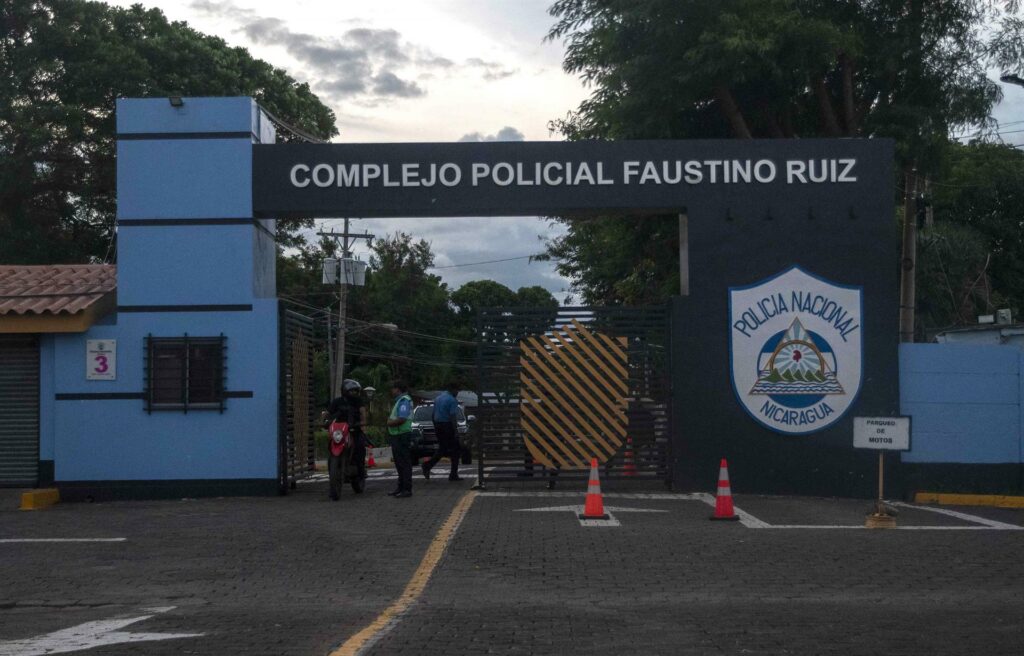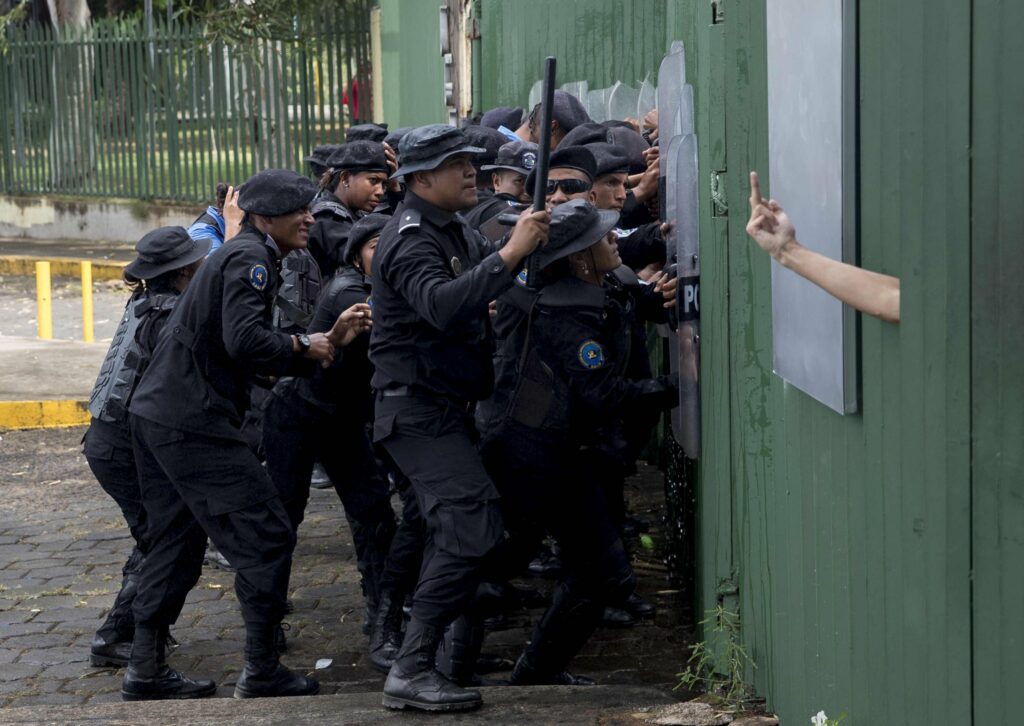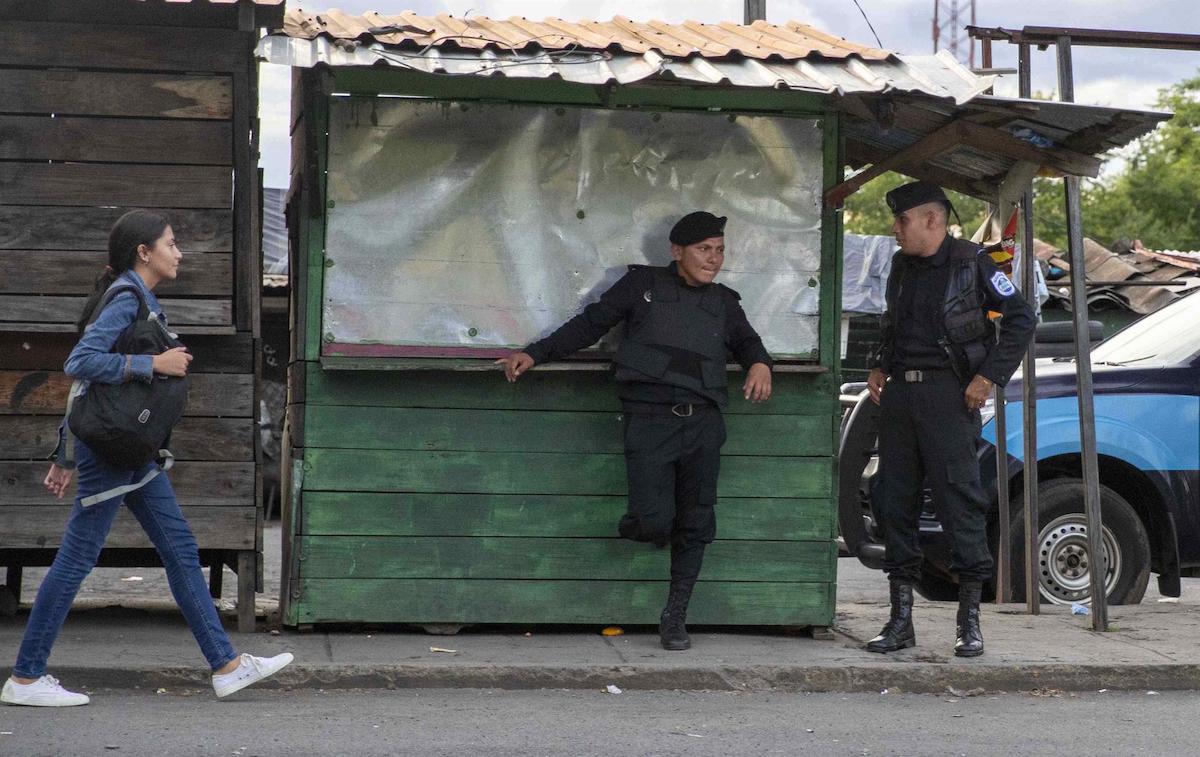The reform to the Law of Organization, Functions, Career and Special Social Security Regime of the National Police (872), which eliminates the “professional and apolitical” nature of the institution and imposes jail time to those who leave its ranks, has caused insecurity and nervousness among the officers who make up the police structure. “The message is clear. If it crosses your mind to leave, you go to jail,” states Carlos*, a police officer consulted by DIVERGENTES on condition of anonymity.
Carlos has worked in the institution for four years. He joined the police force out of economic “necessity.” “I had to provide for my children and my wife,” explained the officer, who carefully read the police reform hours after its approval in the Nicaraguan National Assembly on July 5th.
The modification to the law, which has to do with the total subordination of the police force to the dictator Daniel Ortega and eliminates the principle of “a professional, apolitical, non-partisan, obedient and non-deliberative institution,” did not concern Carlos, who explains that obedience is something that has always been emphasized to him in the institution since he joined the police ranks.
However, what did cause concern to Carlos were the three new articles that have to do with crimes committed by police personnel, breach of duty and desertion. The new regulation establishes that whoever abandons the service will be considered a deserter and will incur in serious damage to public safety, punishable with two to three years of prison.
According to him, any officer who leaves his post without giving notice is considered a traitor. This designation also applies to officers who request termination, even with justified reasons. “To the chiefs, those who leave are deserters,” Carlos notes.
Another officer consulted by DIVERGENTES about this subject expressed that, although he does not feel that the reform is an immediate threat to his decision whether or not to continue working in the police institution, it has made him think about whether one day he will be able to resign to work in something else.
“I studied a technical degree and in my spare time I repair electrical appliances. At one time I thought of setting up a shop and tending to it full-time, but I don’t know if this will be possible with the reform. Maybe they are just scaring those who want to leave the country,” says the agent, who also requested anonymity, with a doubtful tone.
A reform with two messages

Law 872 did not contemplate the term desertion before the reform. Neither did it include a prison sentence for leaving the National Police. The law only referred to “termination” and attributed it to the dismissal of any member of the force.
Termination, according to the old regulations, would be granted only by death, retirement, institutional convenience, abandonment of duty, or a disciplinary resolution. Or by a final court sentence for intentional crimes or for reckless crimes when the sentence of imprisonment is greater than one year.
“The reform aims to restrict desertions. The goal is to frighten agents so that they don’t leave. This is the first clear message: if you leave, you go to jail,” explained a high-level source linked to the National Police.
The source also emphasized that while the reform does not state that it is forbidden to request termination, it does not mean that this possibility is open.
“All police officers know that those who resign, that is, request termination, are considered deserters. This categorization, which does not exist in the law, imposes terror. Now officers will think twice about requesting termination out of fear of being arrested,” explains the source.
Carlos also mentioned that there is uncertainty among his colleagues about the reform and its consequences for officers who wish to leave the institution because of justified reasons.
“A colleague of mine told me that his mom wanted to petition him to take him to the United States. But now he is afraid because he feels that they are onto him. Previously, you could request to leave and everything would be fine, but now it’s not. There is great tension,” says the officer.
According to the high-level source linked to the National Police, the second message that the Sandinista dictatorship is sending is directed to its ranks and the population in general.
“On the one hand, it puts pressure on police officers so they do not to abandon him (Ortega). On the other hand, it shows weakness, as they recognize that people are leaving them. And they can’t hide that,” says the source, who added that in recent months many agents of the institution resigned and abandoned their jobs to leave on parole to the United States.
Police desertions since 2018

One of the strongest complaints came from officer Faber Antonio López Vivas’ mother. She accuses the National Police of murdering her son because he wanted to desert at the peak of the crisis. She explained that her son didn’t agree with the repression. A few days later he was found dead at the morgue of the Institute of Legal Medicine.
In June 2018, newspaper La Prensa revealed the desertion of 14 police officers from the Matagalpa police station, including that of the director of medical services, Hildebrando Toledo. A month later, the Permanent Human Rights Commission (CPDH), made public the desertions of at least six police officers from the Ajax Delgado station in Managua. Among them were Michael Alejandro Delgado Vargas and Juan José Blandón Gómez. According to the CPDH, the officers refused to carry out repression, and resigned.
In 2018, cases of officers who were discharged for refusing to participate in repression were also made public. Lieutenant María Teófila Aráuz was expelled after she wrote in her WhatsApp status, “Long live the students!” While Julio César Espinoza Gallegos was imprisoned for several months because he refused to inform on his neighbors in Diriamba, where he lived.
Also in 2018, the case of Michael Caballero Ayala came to light, a 31-year-old officer who also deserted for the same reasons and was imprisoned in November of that same year. Since then, he was held in La Modelo, until he was released this past February 9th, among the group of 222 political prisoners who were exiled to the United States. He was in jail for four years and three months.
On June 6th, 2019, anti-narcotics lieutenant Edwin Antonio Hernández Figueroa, from the León police station, deserted because he did not want to be part of repression. Hernandez left his testimony in a video, in which he appeared showing his uniform, pistol, and badge, among other equipment. Five days later, when he tried to flee the country, he was detained by the police. Hernandez, who had been working in the institution for 13 years, was sentenced to six years in prison. He was released three and a half years later.
Other more recent desertions include those of four police officers from Managua’s District IV in May of this year. And that of Deputy Commissioner María de Jesús Guzmán Gutiérrez, head of the Matagalpa police block, who fled to the United States two years after being promoted to her post.





